Search Results
Search
Filter results
Advanced Filters
Your search returned 562 Solutions
-
A national effort to promote employment in the ICT sector
The programme equips people with various disabilities with the skills required for work in the ICT sector, and places them in appropriate companies. Launched in 2013, it has trained 467 people by 2016. 83% of them (one third women) are employed full-time in 16 companies and are paid entirely by their employers.
MCIT - Egypt Ministry of Communications and Information Technology, Employment Opportunities for Persons with Disabilities Programme of 2013 Ministry of Communications and Information Technology (MCIT), in cooperation with Misr El Kheir Foundation (MEK), Chamber of Communications and Information Technology (CIT) and Daesn, Egypt, Egypt -
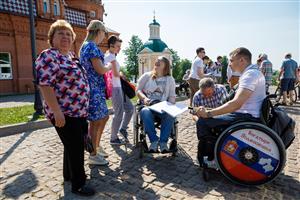
A social franchise model for accessibility experts
In 2015, the All-Russian Society of Disabled People (ARDS) began to conduct accessibility seminars throughout the country. In order to support many of the people it trains, the ARDS set up expert centres across Russia, offering advice and financial support. By 2019, some 480 experts were working in 64 of 85 regions of Russia.
All Russian Society of Disabled People, Certification in Accessibility Expertise, Russia -
Economic and social inclusion
The Unlocking Potentials programme contributes to improving the living conditions of persons with disabilities in Lebanon and supports them in accessing formal employment through vocational training. It provides comprehensive support for jobseekers, job opportunities in public and private sectors and a pilot scheme for income generation.
LPHU - Lebanese Physical Handicapped Union, Economic and social inclusion, Lebanon -
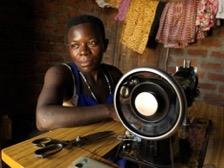
Jobs for the most marginalised people with disabilities
The project focuses on three main areas: Targeted skills development, interventions and responds to the specific needs and interests of the participants and home-based enterprises for those with severe mobility challenges. From 324 participants in 2014 to 2016, 254 have found employment, 49% were female.
Sightsavers, Project “Connecting the Dots”, United Kingdom -

Two restaurants run by persons with disabilities
"Ízlelő Restaurants" are adapted to the needs of employees, with special work procedures and ongoing training. The first restaurant was opened in 2007, and 46 people with various disabilities are now employed in two restaurants and the model has been developed into a social franchise handbook.
Kek Madar Foundation, Ízlelő restaurants – Tasty restaurants, Hungary -
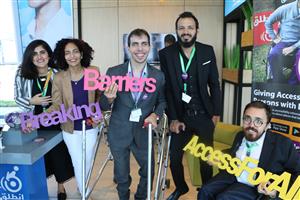
Using analytic tools to make workplaces more accessible and jobs more inclusive
Helm is working with companies in Egypt to provide both job analysis for recruitment and accessibility consultancy services, including accessibility audits. By 2020, Helm had completed a total of 1,063 accessibility audits in a number of sectors and helped recruit 100 people with disabilities.
Helm, Workplace Inclusive Solutions, Egypt -
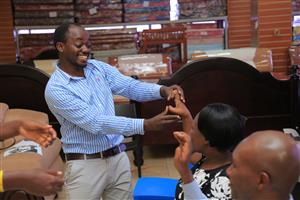
Young people trained as Disability Inclusion Facilitators to motivate employers
The Make 12.4% Work initiative is led by young people with disabilities who are trained and certified as Disability Inclusion Facilitators. They train member organizations to become more inclusive. From 2018 to 2020, 124 organizations have become members and 5,700 people have benefited.
Light for the World Austria, Make 12.4% Work-Initiative, Uganda -
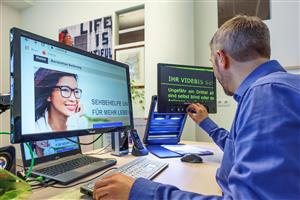
Workplace adaptations for the blind as a business service
VIDEBIS is a supplier of visual aids. If a customer is visually impaired an assessment of the visual impairment is carried out, and the best solution in terms of hardware, software, and training is determined. Between 2016 and 2019 more than 1,000 workstations were equipped.
VIDEBIS GmbH, Workplace Adaptation, Austria -
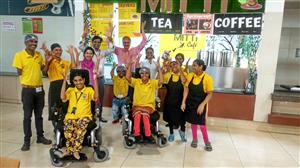
Fast-growing café chain with a majority of employees with disabilities
Since 2017, Mitti Café has been providing hospitality training and employment opportunities in accessible cafés established on the premises of educational institutions or private-sector companies. As of 2020 there are 12 Mitti Cafés, which are managed and staffed entirely by adults with disabilities.
Mitti Cafe, MITTI Café, India -
Person-centred support model for university students
Through the UNESCO Chair project students with different impairments manage their own learning process and support needs. They can draw on a variety of resources, including a peer support programme. For teachers and families the chair offers workshops on person-centred educational planning.
Salesian Polytechnic University, UNESCO Chair on Support Technologies for Educational Inclusion, Ecuador
- Page 1
- Page 2
- Page 3
- Page 4
- Page 5
- Page 6
- Page 7
- Page 8
- Page 9
- Page 10
- Page 11
- Page 12
- Page 13
- Page 14
- Page 15
- Page 16
- Page 17
- Page 18
- Page 19
- Page 20
- Page 21
- Page 22
- Page 23
- Page 24
- Page 25
- Page 26
- Page 27
- Page 28
- Page 29
- Page 30
- Page 31
- Page 32
- Page 33
- Page 34
- Page 35
- Page 36
- Page 37
- Page 38
- Page 39
- Page 40
- Page 41
- Page 42
- Page 43
- Page 44
- Page 45
- Page 46
- Page 47
- Page 48
- Page 49
- Page 50
- Page 51
- Page 52
- Page 53
- Page 54
- Page 55
- Page 56
- Page 57